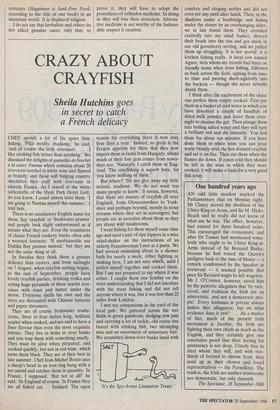CRAZY ABOUT CRAYFISH
Sheila Hutchins goes in secret to catch a French delicacy
CHEF spends a lot of his spare time fishing. 'Pike mostly, madame,' he said, 'and of course the little ecrevisses . . . I like cooking fish better than anything.' We discussed the delights of quenelles de brochet a la sauce Nantua which contains about 20 ecrevisses sozzled in white wine and flamed in brandy, and those soft bulging country omelettes they stuff with ecrevisses in eastern France. As I stared at the white tablecloths of the Hyde Park Hotel Grill, do you know, I could almost taste them. 'I am going to Nantua myself this summer,' I told him.
There is no satisfactory English name for them. Say 'crayfish' or 'freshwater prawns' and people look slight embarrassed as if unsure what they are. Even the translators of classic French cookery books often add a worried footnote: 'If unobtainable use Dublin Bay prawns instead,' but they are not the same thing at all.
In Sweden they think them a greater delicacy than oysters, and from midnight on 7 August, when crayfish netting begins, to the end of September, people have lovely crayfish parties, drinking vodka and eating huge pyramids of these scarlet ecre- visses with toast and butter under the moon. Everyone shells his own and the trees are decorated with Chinese lanterns and paper streamers.
They are of course freshwater crusta- ceans, three to four inches long, brilliant scarlet when cooked, and are said to have a finer flavour than even the most exquisite lobster. They live in holes in river banks and you trap them with something smelly. They must be alive when prepared, and cooked quickly, but not in red wine, which turns them black. They are at their best in late summer. Chef Jean-Michel Bonin uses a sheep's head in an iron ring hung with a net snood and catches them in quantity. In France, I supposed. 'But not at all!' he said. 'In England of course. In France they are all fished out. . . finished. The open season for crayfishing there is now only four days a year.' Indeed, so great is the French appetite for them that they now import them in tanks from Hungary, where much of their foie gras comes from nowa- days too. 'Naturally I catch them in Eng- land. The crayfishing is superb here, for you know nothing of them.'
But where? 'Do not give away my little secrets, madame. We do not want too many people to know.' It seems, however, that there are masses of crayfish all over England, from Gloucestershire to York- shire and perhaps beyond, mostly in trout streams where they act as scavengers; but people are as secretive about them as they are about wild mushrooms.
I went fishing for them myself some time ago and used a pair of ripe kippers in a wire salad-shaker on the instructions of an elderly Frenchwoman I met at a party. We had several swimming about in a shower bath for nearly a week, either fighting or making love, I am not sure which, until I pulled myself together and cooked them. But I am not prepared to say where it was either. I caught them one Sunday on the strict understanding that I did not interfere with the trout fishing and did not tell anyone where it was, but it was less than 25 miles from London.
I met my companions in the yard of the local pub. We pattered across the wet fields in green gumboots, dodging cow pats and carrying a lot of tackle, old cocoa tins baited with stinking fish, two shrimping nets and an assortment of unsavoury bait. We scrambled down river banks lined with 'It's the Spy-Arrest Limitation Treaty.' comfrey and stinging nettles and did not even see any until after lunch. Then, in the shadows under a footbridge and hiding under the stones by an overhanging alder, we at last found them. They crowded excitedly into my salad basket, shoved their heads into the tins and got stuck in our old gooseberry netting, and we pulled them up struggling. It is not sportif, it is kitchen fishing really. A local cow named Agnes, with whom my friends had been on friendly terms when trout fishing, followed us back across the field, sighing from time to time and peering short-sightedly into the buckets — though she never actually drank them.
I think after the excitement of the chase one prefers them simply cooked. First put them in a bucket of cold water in which you have dissolved a couple of handfuls of dried milk powder and leave them over- night to cleanse the gut. Then plunge them into boiling salted water and they will turn a brilliant red and die instantly. You boil them for about ten minutes. If you have done them in white wine you can pour warm brandy over the hot drained crayfish and set it on fire. Then eat them when the flames die down. If eaten cold they should be left in the wine in which they were cooked; it will make a basis for a very good fish soup.
















































 Previous page
Previous page